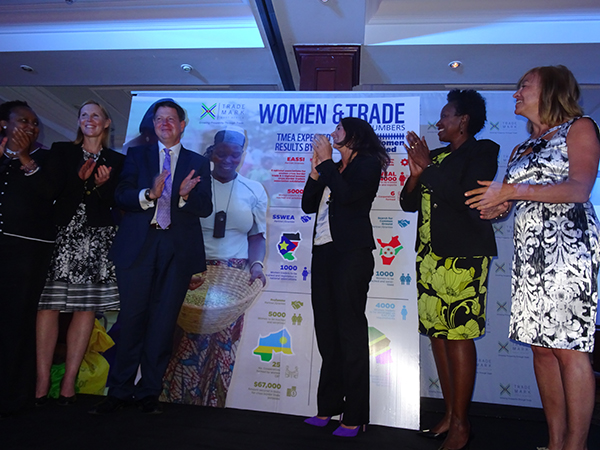
Our Projects are
Transforming African Trade
Quick Contacts
2nd Floor, Fidelity Insurance Centre Waiyaki Way, Westlands
Successful regional integration needs women at the centre of business and trade
Nairobi, 15th October 2015 – TradeMark Africa (TMA) today launched a USD 4.5 million Women and Trade programme in an event graced by Kenya’s Cabinet Secretary for foreign affairs. H.E. Ambassador Amina Mohammed and the Deputy Ambassador, Embassy of the Kingdom of Netherlands to Kenya H.E Marielle Geraedts. Other guests included Country Head of DFID Kenya, Lisa Philips and TMA CEO Frank Matsaert.

Funded by the Kingdom of the Netherlands, the programme targets 25,000 women traders in Uganda, Kenya, Rwanda, Burundi, Tanzania and South Sudan; and will run for approximately one year. A second five year phase is envisaged for 2017 with a USD 15million budget committed to the effort.
Speaking during the ceremony, H.E. Amb. Amina Mohammed said, “Empowering women creates a positive multiplier effect on poverty reduction, economic growth, government revenues and employment creation, among other factors. We indeed are grateful to TMA and its partners for playing a big role in reducing poverty by increasing participation of women in export and trade in East Africa, increasing in female employment, increasing the value of exports and also supporting women in SME’s in East Africa. As a Government we are keen to see the successful integration of the region and an overall functional Free-Trade area for the continent – this cannot happen without the labour of women.”
The Women and Trade (WaT) programme seeks to increase incomes and improve livelihoods for women traders and women-owned enterprises through capacity building, addressing trade barriers and advocacy for policies that will create an enabling environment for them to thrive.
A World Bank Report “Engendering Development,’’ reveals that women reinvest up 90% of their income in education, health and nutrition of their family and community compared to 30 to 40% for men. A report by the Food and Agriculture Organisation (FAO) further notes that if women had same access to productive resources, they could produce 20 to 30% more food significantly increasing product yield translating to up to 150 million fewer hungry people. Some benefits of TMA’s women and trade programme in Rwanda demonstrates that with increase in revenue, women are now able to afford medical insurance and education costs for their children.
Frank Matsaert, CEO, TMA, said, “Historically women have been marginalised either overtly through violence or subtly by exclusion. Government and Private Sector need to jointly show their recognition of women’s labour by providing a fair and productive environment for them to trade. It is therefore important to continually advocate for balanced frameworks and policy change that will nurture the growth of women in cross border trading. TMA’s programmes seek to use existing infrastructure to implement and roll out the various interventions focusing on women informal cross border traders. Women’s inclusion is very important to improving the region’s overall business competitiveness.”
In South Sudan, TMA will partner with local NGO’s who are training and empowering women trading in Shea butter and honey. In Rwanda, TMA supports Profemmes to mobilise women to form and register cooperatives through which they can collectively market their produce. In Uganda, TMA partners with Uganda Women Entrepreneurs Association (UWEAL) who train women in business and increase their influence in national and regional trade.
In partnership with local organisations who will implement the project, TMA seeks to significantly contribute to women traders’ increased knowledge on EAC trade and export procedures by December 2016. Targets include a 10% average increase in revenues of the targeted women exporters and traders; 30% increase in the use of formal trade channels/systems by the targeted women cross border traders and the adoption of policies, regulations or practices that support an enabling environment for women.
In addition to the 25,000 direct women beneficiaries, the program will also engage border customs officials at 12 EAC border posts in policy dialogue and capacity development initiatives.
According to Lisa Karanja, Senior Director, Business Competitiveness TMA: ‘’…these efforts will enable women traders to overcome key challenges including access to market and trading information, understanding of customs and immigration requirements, compliance with standards, business development skills and access to finance. Additionally, TMA will continue to strengthen women traders’ associations, groups and cooperatives to enable them to effectively engage with policy makers at national and local level; access group loans and engage in collective marketing’’.
WaT is part of a larger initiative by TMA to tackle poverty and reduce inequality through increased trade and competitiveness. The organisation has over the last four years supported women traders associations including Eastern African Sub regional Support Initiative for the Advancement of women (EASSI), East African Women in Business Platform (EAWiB), Search for Common Ground (SFCG) in Burundi and Profemmes in Rwanda. EASSI, for example has increased access for cross border traders to relevant trading information through the establishment of resource centers at select border points. To date, these interventions have benefitted at least 2700 women cross border traders across the EAC.
The official launch was presided over by H.E Marielle Geraedts, Deputy Ambassador of the Netherlands, together with TMA Board Member Patricia Ithau and TMA Council Member, Karin Andersson.
Source: TradeMark Africa (TMA)
TradeMark Africa (TMA) is an aid-for-trade organisation that was established with the aim of growing prosperity in East Africa through increased trade. TradeMark Africa (TMA) operates on a not-for-profit basis and is funded by the development agencies of the following countries: Belgium, Canada, Denmark, Finland, the Netherlands, UK, and USA. TradeMark Africa (TMA) works closely with East African Community (EAC) institutions, national governments, the private sector and civil society organisations.
Disclaimer: The views and opinions expressed in this article are those of the authors and do not necessarily reflect the official policy or position of TradeMark Africa.